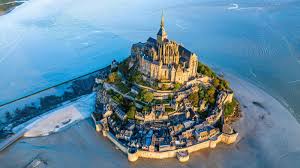Mont Saint-Michel, France
🏰 Mont Saint-Michel: The Floating Abbey of France
Rising like a medieval mirage from the tidal flats of Normandy, Mont Saint-Michel is one of Europe’s most magical and iconic landmarks. This UNESCO World Heritage Site is a rocky islet crowned by a sky-piercing Gothic abbey, surrounded by twisting village lanes and embraced by the Atlantic's shifting tides.
It’s not just a destination — it’s a vision. For over a thousand years, pilgrims, poets, and travelers have crossed its causeway, drawn by its spiritual aura and sheer beauty. Whether shrouded in sea mist or glowing in golden dusk, Mont Saint-Michel seems to float between heaven and earth.
🌊 Island of Illusions: The Tidal Marvel
Mont Saint-Michel sits in one of Europe’s most extreme tidal zones. At low tide, it’s surrounded by vast mudflats and sandbanks; at high tide, water rises up to 14 meters, transforming it into a true island — sometimes in mere hours.
-
Access: A modern causeway allows safe year-round access, but watching the tide come in — at speeds up to 6 km/h — is an unforgettable spectacle.
-
Guided Walks: For a more immersive experience, take a barefoot walking tour across the sands with a licensed guide who shares stories, history, and local ecology.
The ever-changing seascape is part of the Mont’s mystery, and why it has long inspired painters and pilgrims alike.
⛪ A Stairway to Heaven: The Abbey
At the summit of Mont Saint-Michel stands the Benedictine Abbey, an architectural marvel built between the 8th and 16th centuries. It's a blend of Romanesque solemnity and Gothic drama, with vertiginous towers and flying buttresses that rise like prayers in stone.
-
Highlights:
-
The Cloister: A serene courtyard where arches frame the ocean horizon.
-
La Merveille (The Marvel): A multi-level structure of chapels, monk halls, and refectories clinging to the rock face.
-
St. Michael’s Statue: A golden sculpture of the archangel atop the spire, slaying a dragon — symbolizing divine triumph.
-
The abbey’s ascent through winding stairways and vaulted halls feels spiritual in itself, echoing the pilgrim path of centuries past.
🏘️ Medieval Maze: The Village Below
Winding down from the abbey is a storybook village, clinging to the island’s slopes with cobbled lanes, half-timbered houses, and stone walls.
-
Grand Rue: The main street, lined with quaint cafés, creperies, and souvenir shops.
-
Historic Inns: Stay in medieval-style lodgings or dine where pilgrims once rested.
-
Ramparts Walk: Circle the island on its ancient walls for sweeping sea and sky views.
Though crowded in peak seasons, early mornings and twilight reveal the Mont’s quiet, mystical soul — best enjoyed with a warm crêpe and cider in hand.
🍽️ Tastes of Normandy: What to Eat
Mont Saint-Michel sits within Normandy’s gastronomic heartland, and local specialties reflect land and sea:
-
Omelette de la Mère Poulard: A famous fluffy omelette cooked over wood fire — iconic but pricey.
-
Salt-Meadow Lamb (Agneau de Pré-Salé): Sheep raised on the salt-marsh grasses around the Mont — tender and savory.
-
Mussels & Oysters: Harvested from nearby bays, often served in white wine and cream sauce.
-
Apple Cider & Calvados: Classic Normandy beverages to sip with your sunset view.
📅 When to Visit
Each season paints Mont Saint-Michel with a different light:
-
Spring (Apr–Jun): Blooming wildflowers, fewer crowds, and clear skies.
-
Summer (Jul–Aug): Best weather, but busiest time — arrive early or stay overnight.
-
Autumn (Sep–Oct): Misty mornings, quieter alleys, and golden tides.
-
Winter (Nov–Feb): Atmospheric, uncrowded, and hauntingly beautiful — though abbey hours are shorter.
🛌 Stay the Night: Sleep with the Tide
While many visit Mont Saint-Michel on day trips, staying overnight is magical:
-
On the Mont:
-
Auberge Saint-Pierre: A 14th-century inn with medieval charm.
-
La Vieille Auberge: Cozy rooms with sea or abbey views.
-
-
Nearby Mainland:
-
Hotels in Beauvoir or Pontorson: More affordable, with shuttle access.
-
Nightfall brings peace to the Mont — as lights flicker, tides return, and the silence of centuries settles over the bay.
🧭 Practical Travel Tips
-
Getting There: 3.5-hour train ride from Paris to Pontorson + shuttle. Parking is on the mainland; free shuttles run across the causeway.
-
Tickets: Entry to the abbey is €11; free with the Paris Museum Pass.
-
Clothing: Wear comfortable shoes — lots of steps and uneven stones.
-
Time Your Visit: Check tide tables in advance — especially for guided mudflat walks.


